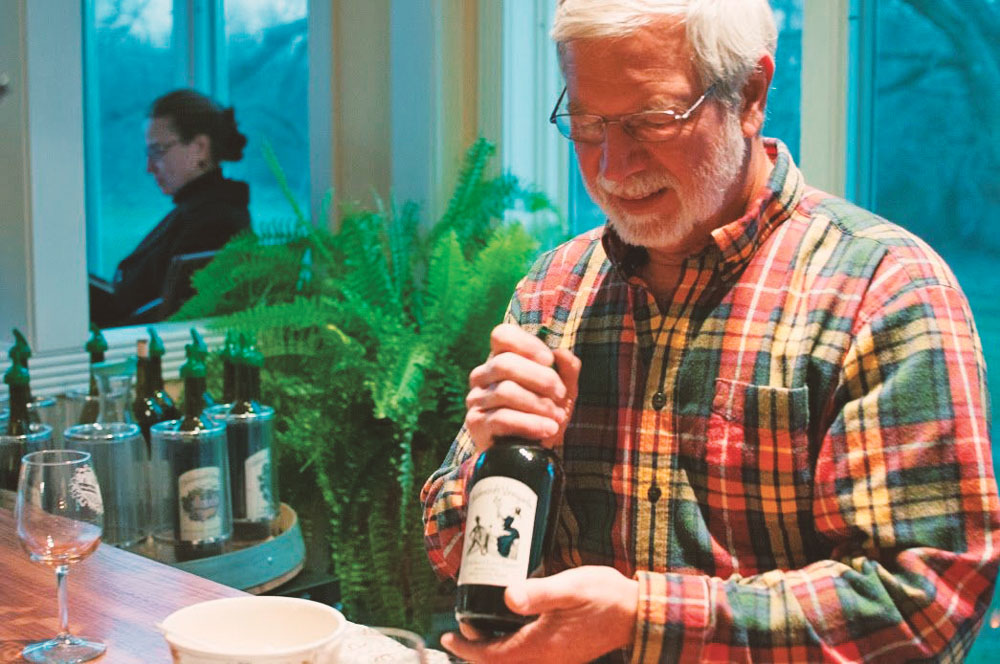Time and oak at hiddencroft

Story and photos by Brian Yost
I visited Hiddencroft Vineyards for the first time back in 2013. I had not heard anything about them and they were not on my radar. In any case, I was up in the far northwestern corner of Loudoun County, it was late in the day and Hiddencroft was nearby. With no expectations, I stopped in for a tasting and was subsequently blown away by the quality of Clyde Housel’s wine.
What sets Hiddencroft apart from nearly every other Virginia winery is the amount of time his wines spend in oak. On my last visit, I tasted a tannat that had been in the barrel for a couple of years and the best chambourcin I have ever tasted that had spent 2.5 years in oak. As I was approaching the tasting room on my most recent stop, I ran into Clyde and he told me they just opened a merlot that had aged 5.5 years in oak. Who does that?

One of several old farm structures at Hiddencroft.
I am not even sure how Clyde pulls this off. There are several reasons that most wineries do not leave their wine in oak for that long. Economically, and this is particularly true for small boutique wineries, it is a matter of revenue. Return on investment will be delayed for many months. Wines are typically rotated through the barrels on a regular interval, so for most wineries 18 months is a long time. If the wine remains any longer, there is a need for additional barrels, which is a serious financial outlay. Of course, storing all of the barrels becomes a matter of logistics and space. Most small wineries do not have the luxury of a large barrel room, where wines can age for more than a few months. So Hiddencroft’s oak program is a bit of a mystery to me, but who am I to question excellence?
Before I move on to the wine, let me give a little background. Germans fleeing the Thirty Years War first settled the property in the 1700s, but the current farm dates back to the 1830s. Many of the original farm buildings are still standing and Clyde is working to restore them. Also on the property are 6 acres of grapes, which provide about 90 percent of the fruit, used to make about 1,500 cases of wine annually. The remaining 10 percent is sourced locally. The vines are meticulously maintained and the wines are made in small batches. Quality is the primary watchword and extensive time in oak is something of an innovation.
At the tasting bar, during my most recent visit, they were pouring 10 wines. Four of them were fruit wines, which I have tasted in the past. They are very good, but I was interested in the grape wines and particularly the merlot. We started with a chambourcin rosé, moved on to a pair of traminettes and then transitioned to the reds. There was a chambourcin that spent two years in oak and a very nice red blend of cabernet franc, cabernet sauvignon and tannat. Finally, we got to the merlot. It is this last wine that I want to talk about in more detail.

Passageway to the tasting room
There is no merlot grown at Hiddencroft. Back in 2009, Clyde traded Doug Fabbioli some cabernet franc for the merlot and subsequently made wine with the grapes. They periodically tasted the wine and it did not measure up. Clyde was hesitant to use it for blending, because it might ruin the blend. So it remained in the barrel, where from time to time it was tasted and considered inferior. But something happens to wine stored in barrels. There is a certain amount of evaporation. So over time, as the liquid condensed, the flavors became more concentrated. The resulting wine is slightly jammy and filled with notes of raisin and cassis. It is a big wine that does not come across like a typical merlot. Simply put, it is like nothing you will taste in the commonwealth or even on the East Coast.
I think the merlot is emblematic of what is happening at Hiddencroft. Clyde is turning out a few wines, particularly his white offerings, which are characterized by a bit of finesse. But the reds are uniformly big and in your face. They have enough character to share. So if you are a fan of this style, as I am, you will need to stop in and see for yourself. ML
Hiddencroft Vineyards: Open year-round Thursday-Monday from noon-6 p.m.; 12202 Axline Road, Lovettsville, VA 20180; 540-535-5367; hiddencroftvineyards.com.


